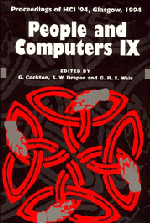Book contents
- Frontmatter
- Contents
- Preface: HCI'94 – You Probably Haven't Seen It All Before
- Part I Invited Papers
- Part II Methodology of Interactive Systems Development
- 3 Transferring HCI Modelling and Design Techniques to Practitioners: A Framework and Empirical Work
- 4 The Use of Visual Indexing as an Interview Support Technique
- 5 A Domain Analysis of Air Traffic Management Work can be Used to Rationalise Interface Design Issues
- 6 Manuals as Structured Programs
- 7 Improving Education through Computer-Based Alternative Assessment Methods
- 8 Visual Programming in a Visual Domain: A Case Study of Cognitive Dimensions
- 9 Evaluating Evaluation Methods
- Crafting Interaction: Styles, Metaphors, Modalities and Agents
- Modelling Humans, Computers and their Interaction
- Notations and Tools for Design
- Part VI Computer-Supported Cooperative Work
- Author Index
- Keyword Index
5 - A Domain Analysis of Air Traffic Management Work can be Used to Rationalise Interface Design Issues
Published online by Cambridge University Press: 04 August 2010
- Frontmatter
- Contents
- Preface: HCI'94 – You Probably Haven't Seen It All Before
- Part I Invited Papers
- Part II Methodology of Interactive Systems Development
- 3 Transferring HCI Modelling and Design Techniques to Practitioners: A Framework and Empirical Work
- 4 The Use of Visual Indexing as an Interview Support Technique
- 5 A Domain Analysis of Air Traffic Management Work can be Used to Rationalise Interface Design Issues
- 6 Manuals as Structured Programs
- 7 Improving Education through Computer-Based Alternative Assessment Methods
- 8 Visual Programming in a Visual Domain: A Case Study of Cognitive Dimensions
- 9 Evaluating Evaluation Methods
- Crafting Interaction: Styles, Metaphors, Modalities and Agents
- Modelling Humans, Computers and their Interaction
- Notations and Tools for Design
- Part VI Computer-Supported Cooperative Work
- Author Index
- Keyword Index
Summary
The demand for a more effective Air Traffic Management system, and the central role of the controller in that system, has focused attention on the design of the controller's interface. This paper presents an analysis of the task domain of Air Traffic Management. It demonstrates with a simulated system how the domain analysis can be used to model the controller's performance in the traffic management task. The use of this model in rationalising interface design issues is then illustrated. The analysis supports the general case for explicitly capturing the task domain in interface design.
Keywords: task domain, domain analysis, air traffic management, task quality, interface design.
The Need for Analysis of the Air Traffic Management Task Domain
The Operational Issue in Air Traffic Management
Increases in the volume of air traffic have consistently exceeded all predictions and now demand a more effective Air Traffic Management (ATM) system. Although the amount of air traffic over the UK has increased threefold in the last three decades, the public evidence points only to its increasing safety (NATS, 1988). Rather, the most pressing concern of the Civil Aviation Authority (CAA) is now the forecast 70% growth in demand on UK airspace over the next decade. This forecast increase is extremely problematic since the UK system is already considered to be operating near capacity, and bottlenecks are publicly visible (Jackson, 1993; John & Macalister, 1991). The same problem faces the US authorities where, even in the 1980s, delays and congestions were estimated to cost between 1 and 1.5 billion dollars per year (Kanafani, 1986).
If safety must not be compromised by further increases in air traffic volume, neither must ‘expedition’.
- Type
- Chapter
- Information
- People and Computers , pp. 53 - 66Publisher: Cambridge University PressPrint publication year: 1994



